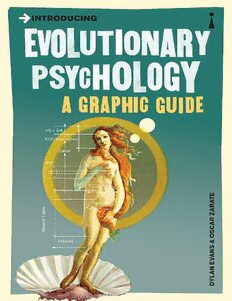
Introducing evolutionary psychology PDF
Preview Introducing evolutionary psychology
Published by Icon Books Ltd, Omnibus Business Centre, 39–41 North Road, London N7 9DP Email: [email protected] www.introducingbooks.com ISBN: 978-184831-977-6 Text copyright © 2012 Icon Books Ltd Illustrations copyright © 2012 Icon Books Ltd The author and illustrator has asserted their moral rights Originating editor: Richard Appignanesi No part of this book may be reproduced in any form, or by any means, without prior permission in writing from the publisher. Contents Cover Title Page Copyright What is Evolutionary Psychology? Cognitive Psychology Actions Are Caused by Mental Processes Behaviourist Psychology The Mind is a Computer Metaphors of the Mind A Testable Model Evolutionary Biology Heredity and Mutation Genes Heredity Mutation Adaptation and Natural Selection Useful Design The Argument from Design Not by Coincidence... Natura non facit saltum Improvement by Accident The Evolution of the Eye The Blind Watchmaker Fitting the Pieces of the Jigsaw Puzzle Together General-Purpose Problem-Solver? Learning a Language Language Acquisition Vision Modularity Massive Modularity No Central Processes Modules and Adaptations Adaptations and Environments Evolving Modules Shared and Unique Modules Out of Africa The Social Environment Adaptive Problems Predator-Avoidance Modules Detecting Predators False Alarms Two Neural Pathways Food Preference Modules Fat and Sugar Environmental Mismatch Disgust Alliance-Formation Modules Living in Groups Alliances and Coalitions Increasing the Group Reciprocal Altruism The Free-Rider Problem The Evolution of Cooperation Tit-for-Tat Cognitive Adaptations for Social Exchange Modules for Helping Children and Other Relatives Kin Selection How Related Are You? Hamilton’s Rule The Evolution of Nepotism The Truth About Cinderella Allocating Resources to Offspring The Resource-Allocation Module Parent-Offspring Conflict How Much For Me? Weaning The Benefit of Weaning Group Size and Social Intelligence Mind-reading Modules Enter Machiavelli Theory of Mind Folk Psycology The Sally-Ann Test Theory of Mind and Autism Lying and Tactical Deception Language Modules The Language Acquisition Device The Evolution of Language Reciprocal Altruism Again Gossip Indirect Reciprocity The Importance of Reputation Mate-Selection Modules The Mating Game The Genes are in the Selection The Importance of Looking Good Body Symmetry What’s the Evidence for Symmetry? The Biology of Beauty The Fertility Factor Selecting a Mate for Parental Care Human Pair Bonds Parental Care and Human Brain Size Will You Make a Good Parent? Sex Differences in Mate Preferences Dads and Cads Battle of the Sexes – or Evolutionary Arms Race? The Myth of the Monogamous Female Women’s Extra-Pair Mating What’s the Best Strategy? Men with Resources Testing Mate Preferences Attractiveness and Age Age and Reproduction Fidelity: Sexual and Emotional Male and Female Jealousy Mapping the Mind Criticisms of Evolutionary Psychology Pan-adaptationism Side-effects and By-products Not Everything is a Module Hypotheses and Confirmations Just-So Stories? Is Logic a By-product? The Wason-selection Task Cheater-Detection Two Features of Mental Modules Modularity Again Reductionism The Simplest Accurate Theory Genetic Determinism Is Too Much Importance Attached to Genes? Nature vs. Nurture Behavioural Genetics Human Variation and Human Nature Are Human Behaviours Inevitable and Unchangeable? Does Evolutionary Psychology Justify the Status Quo? The Naturalistic Fallacy Mistaken Criticisms and Misunderstandings The Legacy of History The Future of Evolutionary Psychology The Darwinian Revolution The Future of Psychology Further Reading The Author Acknowledgements Index What is Evolutionary Psychology? Evolutionary psychology is the combination of two sciences – evolutionary biology and cognitive psychology. These two sciences are like two pieces of a jigsaw puzzle. We need both pieces if we want to understand human behaviour. We will begin by looking at each of these sciences separately. Then we will see how evolutionary psychology puts them together to arrive at a complete scientific account of human nature. Cognitive Psychology Cognitive psychology is the most powerful theory of the mind ever developed. It has transformed psychology from a vague set of unclear ideas into a true science. There are two main ideas. (1) Actions are caused by mental processes. (2) The mind is a computer. you mean, the mind is like a computer? no, and you’ll see why in a moment ... Let’s have a look at these two ideas in more detail. Actions Are Caused by Mental Processes Psychology is the science of human behaviour. It attempts to explain why humans act the way they do. We are all amateur psychologists. We constantly offer explanations for our actions and for the actions of others. For example, when I see Jim pick up an umbrella as he leaves the house, I might explain this action in the following way. jim thinks it’s going to rain, and he wants to stay dry. this kind of explanation is called a mentalistic explanation because it refers to mental processes like beliefs and desires. When we say that “Jim thought it was going to rain”, we are saying that Jim had a certain belief. When we say that “Jim wanted to stay dry”, we are saying that Jim had a certain desire.
